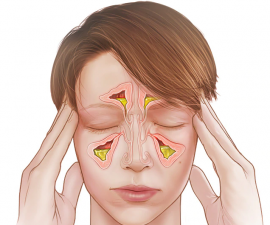… Continued …
- Nasal symptoms, such as nasal congestion or runny nose (typically with yellow or green discharge that signals the infection).
- Facial pressure or pain, such as under the eyes, around the eyes, around the nose, or on forehead – depending on where the inflammation occurs.
Tiredness (fatigue) and dizziness (such as lightheadedness with headache) could be the secondary symptoms of sinusitis. But if you have them without the main sinusitis symptoms, they are less likely to be associated with sinusitis.
Even in people with sinus infection, feeling exhausted and headache could be caused by something else (in some cases). Other secondary symptoms of this infection may include:
- A high temperature (fever).
- Sinus toothache.
- A decreased sense in smell. Even the infection may lead to bad breath.
- Cough that is difficult to go away and often worsens at night.
- The speech that sounds nasal.
- Or diarrhea (in a few cases).
What you can do?
If your dizziness and fatigue do link to your sinusitis, they should improve as the infection and inflammation of the affected sinuses heal in time. The acute sinusitis symptoms usually clear up not more than 4 weeks. But for chronic sinusitis, they can last within several months (longer than 8 weeks), as noted before.
Acute sinusitis, especially if it’s caused by viral infection, usually doesn’t need medication. For such case, you can look after yourself at home (see also best home remedies for sinus problem)! But if you have some of the following conditions, it’s much better to see your doctor!
- If your symptoms are not mild, severe – or if they last longer than you expect (more than 7-10 days) or get worse.
- If you have episodes of sinusitis frequently!




